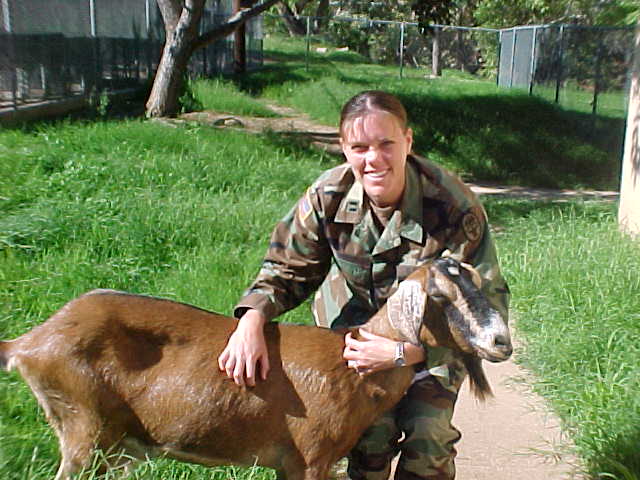Serving our country and our pets
How serving as a US Army head veterinarian led Fetch faculty member Dr Amy Pike to her passion for veterinary behavior
All photos: Dr Amy Pike while serving in the US Army.

San Diego Fetch Faculty member Amy Pike, DVM, DACVB, IAABC-CABC, with Animal Behavior Wellness Center in Fairfax, Virginia, who delivered lectures on behavior this past weekend, has a unique story to how she discovered her niche in veterinary medicine. It started in 2003, when she graduated from Colorado State University College of Veterinary Medicine & Biomedical Sciences and was commissioned as a Captain in the US Army. There, she was the head veterinarian for her base’s small veterinary clinic, where she held varied responsibilities and thoroughly enjoyed the role.
In an interview with dvm360® Pike said, “Being an army veterinarian was probably the most fun career thing I've ever done because every single day was very different. One day, I might be doing food inspections, inspecting tomatoes being packed at a packing plant or Krispy Kreme Doughnuts being made at a Krispy Kreme shop. And then the next day, I might be treating a military working dog or one of our US Customs and Border Protection horses. And then the next day I might be seeing clinical pets from our military members.”

This experience in active-duty military from 2003 to 2006 is what inspired Pike’s interest in veterinary behavior as military working dogs were coming back from deployments in Iraq and Afghanistan and were showing signs of what we know today as post-traumatic stress disorder (PTSD). “There was a veterinary behaviorist who consulted with the military and recommended that I put [the dogs with PTSD] on Fluoxetine (Prozac), and do some behavior modification with their trainers. It was amazing how different they were after that, and I just thought that was so cool that we can do the same that we do in human psychiatry with our veterinary patients too.”
As she returned to civilian life, Pike further pursued her passion for veterinary behavior and began her residency program, spending 3 years seeing behavior cases and taking additional college courses in psychology and advanced animal sciences. In October 2015, she became among the fewer than 70 board-certified veterinary behaviorists in North America.
Since then, Pike has made her mark helping veterinary behavior patients at the Animal Behavior Wellness Center, and in a dvm360® interview, also outlined some of her favorite cases and expert insight she has acquired in the field. Though according to her compulsive disorders are especially challenging to treat, Pike finds them most fascinating. “We're talking dogs that spin and chase their tail or may suckle on blankets or their flank,” she explained. “[Compulsive disorders] are very difficult to treat because there's so many factors at play there, and not to mention that the compulsive disorder really is a deep brain pathology that needs the right medication combination to be treated appropriately.”
When approaching behavior patients, Pike devised a method she deemed the “6 M Formula” which includes medical rule outs, management, mental enrichment, modification of behavior, medications & products, and monitor & modification of the treatment plan. She described some of this process in the interview with us, “[Medications] are only appropriate when there's an emotional underpinning, like fear, anxiety, or stress. And when we are unable to keep that animal under threshold to perform the behavior modification...and then the last one is really monitor and modify the plan because no plan is going to be perfect going out the door with the patient.”